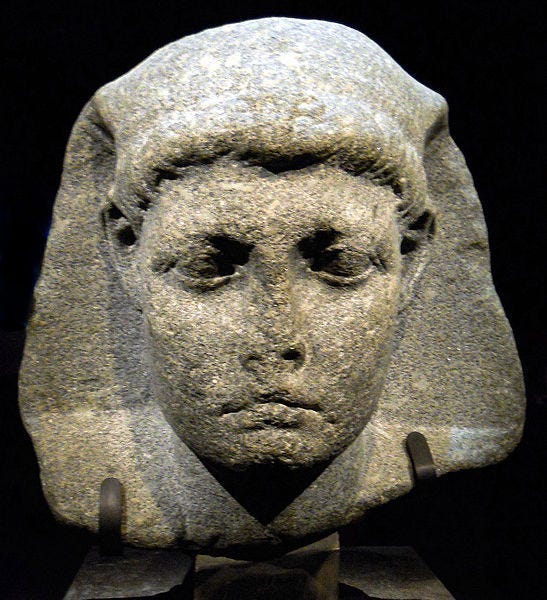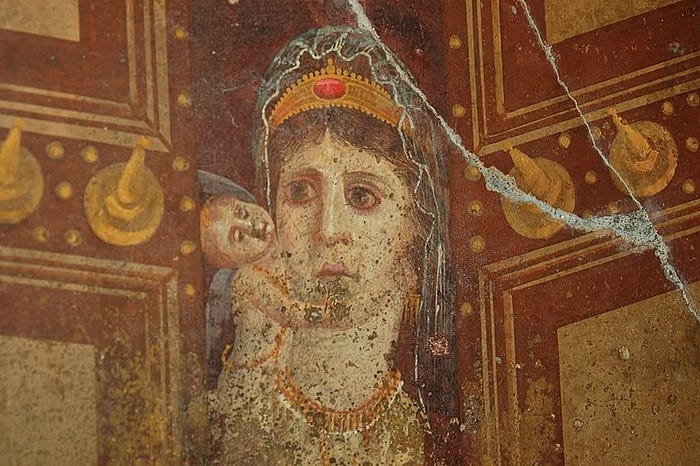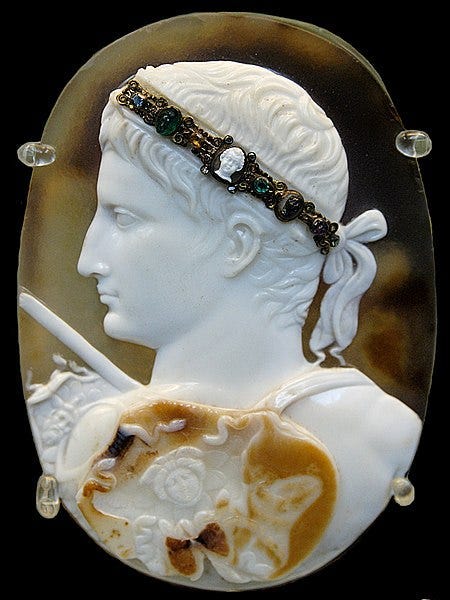
The death of Julius Caesar is a tale that many know, but there’s a twist within it that escapes the attention of most. Namely, a child. During the upheaval in Rome at the ides of march, a special visitor was present. He was being cared for by one of the most famous women in history — his mother — the Egyptian queen Cleopatra. He went by the name Caesarion, or “little Caesar.”
His story gets lost in the mix. Mainly because it’s a short one, although the child’s very presence was a significant influence between the factions fighting for control of the Roman empire. Unfortunately, his name, or namesake sealed his fate.
There are instances in history where one’s very birth or lineage puts a target on their head. Caesarion was a prime example. For as you’ll soon see, there can only be one Caesar.
But I’ve gotten ahead of myself. Let’s step back. We need to start with the “big Caesar” before we can get to the tale of the little one.
Love And Civil Wars
Caesar’s ascent to emperor was guaranteed after he defeated Pompey in the Roman civil war in 48BC. His rival sought help in Egypt but was killed. According to Michael Gray-Fow in his scholarly article “What To Do With Caesarion,” the order came from a court eunuch Pothinus.
Pothinus pulled the strings of the boy-king Ptolemy VIII and had his sister-wife Cleopatra banished. But Pompey’s murder didn’t make Caesar leave. The Roman intervened in Egyptian politics. Unsurprisingly, after meeting Cleopatra, he demanded she be restored to her position as co-ruler.
Pothinus and the king’s forces that prepared for Cleopatra now attacked Caesar’s army. Within a year Caesar defeated the queen’s rivals. Ptolemy VIII died in the fighting and this left Cleopatra in firm control of Egypt. Although she took her youngest brother as co-regent to satisfy tradition.
It also left time for Cleopatra and Caesar to develop a relationship. Despite the major age difference— fifty-two for the Roman and twenty-two for the queen — there was chemistry. According to Gray-Fow:
“Both were risk-takers, both were ruthlessly ambitious, and both were proud…highly intelligent and well educated, and neither felt bound to follow convention where it conflicted with their goals. It is likely they fascinated each other…”
He also believes the pregnancy was a deliberate decision. Cleopatra saw the child as a successor to a future powerful Roman ruler. Caesar’s goals were less certain. Although the queen was considered a goddess in her land, plus was related by blood to Alexander The Great, who the Roman esteemed.
Perhaps it satisfied his ego to have a child of such noble heritage.
It’s thought Caesarion was born in the summer of 47BC. By this time, his father had left Egypt, chasing down allies of Pompey and eventually making his way back to Rome.
A Short-Lived Reunion

“Finally he [Caesar] called her [Cleopatra] to Rome and did not let her leave until he had ladened her with high honors and rich gifts, and he allowed her to give his name to the child which she bore. In fact, according to certain Greek writers, this child was very like Caesar in looks and carriage.”
— Suetonius as quoted by the World History Encyclopedia
Cleopatra and her royal court (including her child-king brother) visited Rome twice in 46 and 44 BC, staying in Caesar’s villa. According to Arienne King at the World History Encyclopedia, Caesarian was likely with the queen both times. Each visit was eventful, to say the least.
In her first visit, Caesar dedicated a temple to the goddess of marriage and motherhood Venus Genetrix — a supposed descendent. But he shocked Rome with its furnishings. Inside there was a gold-covered statue of Cleopatra as a version of Venus and the goddess Isis.
If the affair wasn’t scandalous enough, now Rome was forced to notice.
During Cleopatra’s second visit, Caesar was assassinated. Obviously, she could sense herself in danger, but stayed long enough to hear the reading of Caesar’s will. There was no mention of Caesarian. But much was left to his nephew Octavian, and he was posthumously adopted by the former emperor.
Octavian soon took to calling himself Caesar, however, there was a problem in his association with his new father. The original Caesar had a son. Now, how could an ambitious social climber in ancient Rome deal with that?
The Fight To Be Caesar
Cleopatra had escaped the chaos in Rome and her brother suddenly died before he reached a mature age. Possibly by her command. She stuck her son on the throne as male co-ruler and found herself involved in another civil war.
Gray-Fow mentions the queen was surrounded by enemies of Caesar who assassinated him. They controlled areas of Rome near Egypt. While they demanded material support from the queen, she dodged their requests helping the other side. It was made up of Octavian and a friend of Caesar named Mark Antony.
Her favored faction won. As Octavian and Antony divided the spoils, the latter got the wealthy Eastern section of the empire. It put Antony in contact with Cleopatra. Again, this favored her position because she possessed something Octavian would like to see disappear.
Despite Antony marrying Octavian’s sister Octavia and having children with her, the two Romans battled publicly — more frenemies than friends. Antony also continued meeting with Cleopatra. For the next three years or so the relationship between the two Romans deteriorated further.
Caesarion was used as a tool between the two wannabe rulers. Antony claimed the legitimate son of Caesar resided in Egypt, while Octavian said the boy was a fraud. At this time King notes Antony married Cleopatra…while still married to Octavia.
Antony also granted his new wife territory in the Parthian empire, which Rome didn’t own, and Caesarian was given the title “King of Kings.” Octavian’s rival with a connection to another child named for Caesar was too much of a threat. War was inevitable.
The End For Egypt
Rome plunged into civil war again. Despite originally having superior forces and funding, Antony and Cleopatra lost. They escaped from Actium in Greece back to Alexandria in Egypt with a mere shadow of their forces and waited for the inevitable. Octavian, now known as Caius Julius Caesar Octavianus would attack.
As their kingdom slowly collapsed, Cleopatra hid the news of the defeat at Actium. According to historian Barry Straus in The War That Made The Roman Empire, she raided temples, executed enemies, and raised funds to arm her people. She also built a fleet. Straus believes she intended to escape to India.
It didn’t help. Octavian slowly crushed the resistance and made his way to the outskirts of Alexandria. While Antony killed himself after a failed battle, Cleopatra shut herself up in a temple with her nation’s riches and kindling, threatening to burn it all.
During the chaos Cleopatra sent Caesarion on his way out of Egypt, again supposedly to India.
There Can Only Be One Caesar

Octavian entered Alexandria with his tutor Arius Didymus, who was from the city, striking a conciliatory tone. Although there’d be no leniency for Cleopatra. Roman forces entered the temple and saved her treasure and she eventually killed herself rather than be taken to Rome as a trophy.
But there was still another Caesar. History records Didymus as modifying a line from Homer “ouk agathon polukoiranie” or “it is not good to have too many leaders.” The tutor changed it to “ouk agathon polukaisarie,” which means “it is not good to have too many Caesars.”
But Straus sees it as politics. Octavian may have put the words into another’s mouth so as not to sully his reputation.
Octavian didn’t need someone advising him to kill his biggest threat. The new emperor lured Caesarion back to Egypt. Whether the child was betrayed by a tutor or just made a bad decision, no one can know for sure. But Octavian made sure his half-brother didn’t live past sixteen.
The now only Caesar went on a victory tour afterwards and created one of the most impressive victory monuments in the ancient world. He also rectified a deficiency of his adopted father.
Plutarch tells a story of Caesar crying at thirty-three because he didn’t achieve as much as Alexander the Great at the same age. So, Octavian visited Alexander’s grave. While he left flowers, Straus also recounts another story told by Cassius Dio where Octavian touched the face of Alexander and broke his nose off — at the age of thirty-three. Propaganda? Well, maybe.
However, before you view Octavian as a child-killing monster, he allowed Cleopatra and Antony’s children to live. His sister adopted them. So, Octavia raised the kids of her ex-husband and the woman who stole him. The new Caesar also didn’t go on a mass killing spree after winning.
He was mainly interested in the death of one unfortunately named for his adopted father. After all, there can only be one Caesar.
Originally posted on Medium 8/26/22


